Wednesday May-28 2025 15:00:42
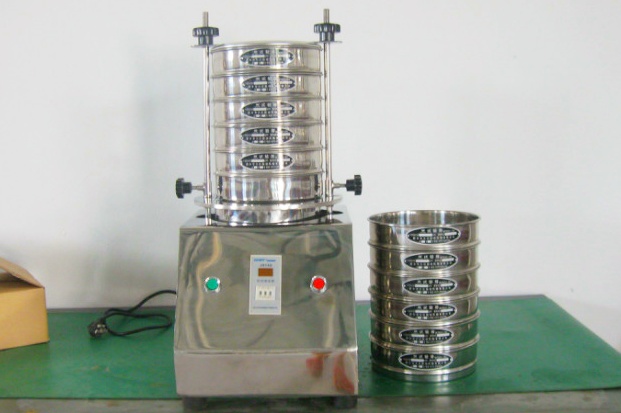
0.5mm stainless steel soil sieve for lab testing is a screening tool commonly used in soil particle analysis. The sieve mesh has a sieve mesh size of 0.5 mm, which can effectively screen out soil particles with a particle size greater than 0.5 mm, and realize particle classification and particle size distribution detection. Stainless steel materials (such as 304 or 316) have excellent rust resistance and mechanical strength, and are not easy to deform, ensuring the accuracy of the screening process and the durability of the sieve. The fine aperture of the 0.5mm sieve is particularly suitable for analyzing the fine sand, silt or clay content in the soil, providing accurate data support for soil classification, agricultural research and environmental monitoring.
Although the aperture of 0.5mm stainless steel soil sieve and 0.5mm brass soil sieve is the same, there are several key differences in material and performance:
|
Aspect |
0.5mm stainless steel soil sieve |
0.5mm brass soil sieve |
|
Image |
|
|
|
Material |
Stainless steel (commonly known as 304 or 316) |
Brass alloy |
|
Corrosion resistance |
Excellent, resistant to acid, alkali and various chemical corrosion |
General, not resistant to strong acid and alkali, easy to oxidize and discolor |
|
Strength and wear resistance |
High strength, wear resistance, suitable for long-term use |
Low strength, easy to wear |
|
Weight |
Heavier |
Lighter |
|
Cost |
Generally higher |
Relatively low |
|
Applicable environment |
Various soils and experimental environments, especially wet corrosive environments |
Dry, non-corrosive environments, or when there are requirements for electromagnetic performance |
|
Electromagnetic performance |
Poor conductivity (non-conductor) |
Good conductivity, suitable for special purposes such as electromagnetic shielding |
Although the aperture of 0.5mm is the same, the stainless steel soil sieve is superior to the brass soil sieve in performance. Considering the high requirements of lab testing for data accuracy and reliability, it is strongly recommended to choose a stainless steel soil sieve to ensure the stability and repeatability of the test results.
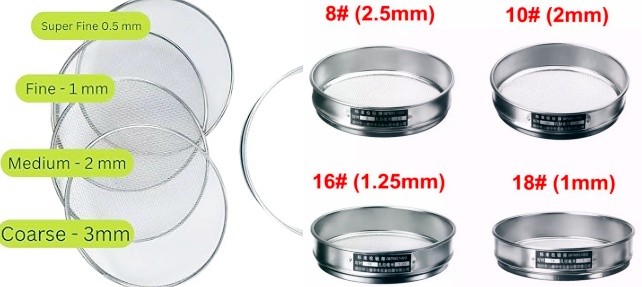
The size of the sieve for soil testing can vary according to different experimental requirements, and the sieve size range is very wide, ranging from tens of millimeters to several microns.
Coarse sieve (used to remove large particles or perform coarse particle analysis): sieve holes larger than 2mm are often used to pre-treat soil samples to remove stones, plant residues, roots, etc. larger than 2mm. For example: 63mm, 50mm, 37.5mm, 5mm, etc.
Fine sieve (used to analyze soil particles of different particle sizes such as sand, silt and clay): Below 2mm, the sieve hole size will become smaller to distinguish sand, silt and clay. Commonly used fine sieve sizes include: 2mm, 1mm, 0.5mm, 0.25mm, 0.075mm (75μm, approximately 200 mesh sieve), which are used to analyze soil particle composition (such as sand, silt, clay content) and evaluate soil texture (such as sand, loam, clay).
The 0.5mm sieve is an important sieving point in soil particle analysis. It is usually used to separate coarse sand and fine sand in the soil. In many tests of soil physical properties, soil samples are pre-treated or graded through a 0.5mm sieve. For a stainless steel soil sieve with a pore size of 0.5mm, in lab tests, the corresponding mesh number is usually 35 mesh.
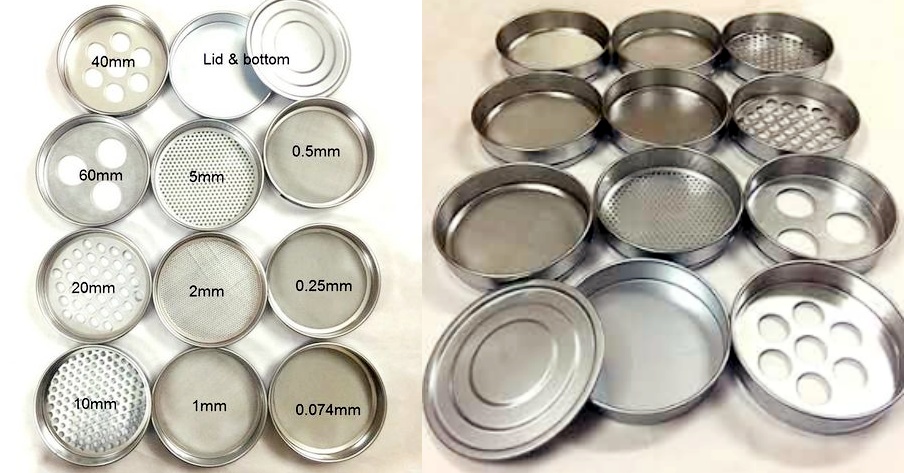
|
Mesh size (Mesh) |
Aperture size (mm) |
Applicable soil particle size range |
Remarks |
|
4 |
4.75 |
Coarse gravel, large particles |
Coarse particle classification |
|
10 |
2.00 |
Large particles, coarse sand |
|
|
20 |
0.85 |
Medium coarse sand |
|
|
40 |
0.425 |
Fine sand |
|
|
60 |
0.25 |
Fine sand |
|
|
100 |
0.15 |
Fine sand, silt sand |
|
|
200 |
0.075 |
Silt sand, fine silt soil |
|
|
325 |
0.045 |
Fine silt soil, clay |
Very fine particles, difficult to screen |
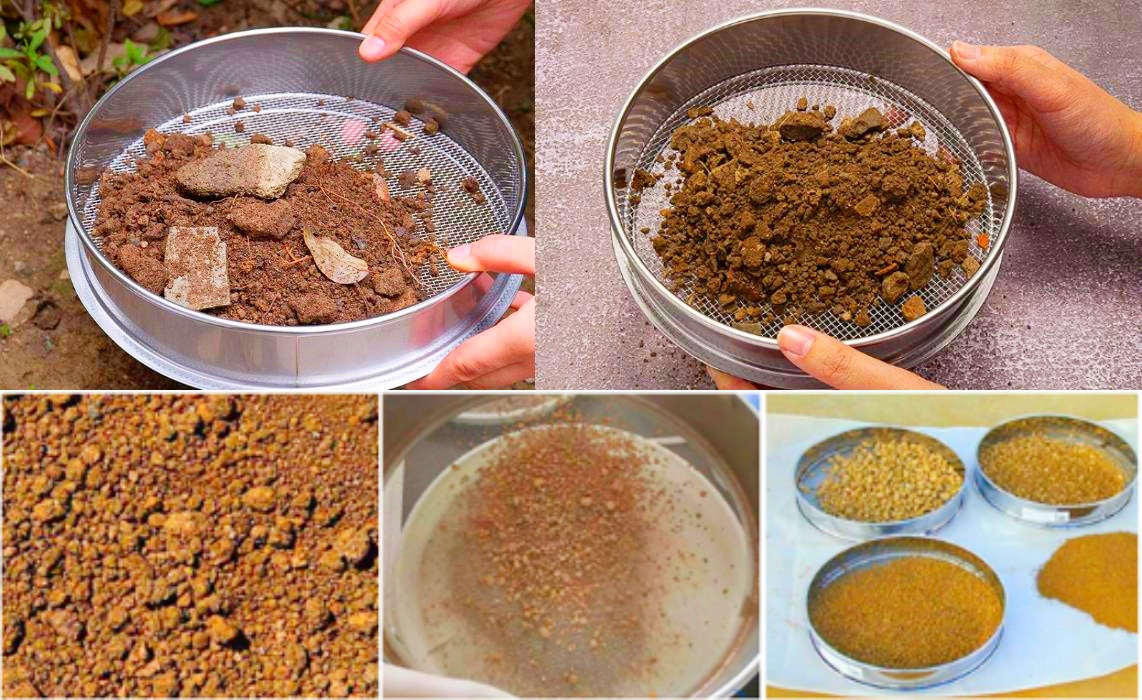
0.5mm stainless steel soil sieve has a wide range of uses in lab testing, mainly for soil particle analysis, microplastic detection, etc. By screening soil samples through sieves with different apertures, the content of different particle sizes (such as sand, silt, and clay) in the soil can be determined, which is very important for soil classification, soil fertility assessment, engineering geological surveys, etc. The 0.5mm sieve can be used to separate larger particles of soil for further analysis of finer particles.
When studying microplastics in soil, it is usually necessary to pre-treat soil samples through sieves with different apertures to separate microplastic particles of different sizes. The 0.5mm stainless steel sieve can effectively screen out microplastics with a particle size greater than 0.5mm. Before conducting experiments such as soil chemical analysis and biological analysis, soil samples need to be pre-treated, including removing debris such as stones and plant residues, and making the soil particles uniform in size. When evaluating the stability of soil aggregates, wet screening is one of the commonly used methods, and the soil aggregates after soaking are screened through sieves with different apertures.
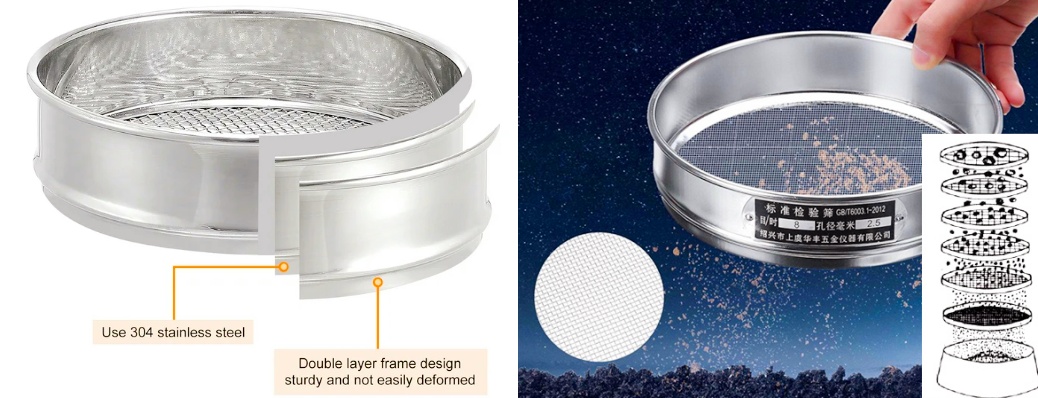
Stainless steel soil sieves have become an indispensable tool in lab soil analysis due to their durability, precision and stability. They are mainly made of high-quality stainless steel materials and are corrosion-resistant, wear-resistant and strong. The sieves are usually made of precision welding or punching technology to ensure that the sieve holes are uniform and stable, and to ensure the accuracy and repeatability of the screening results. The 0.5mm stainless steel sieve has a small sieve hole and is suitable for the graded analysis of fine soil particles. It can effectively separate fine particles and facilitate the study of the particle size composition and physical properties of the soil.
What is the wet sieving process?
Wet sieving process is a sieving process assisted by a liquid (usually water or a solution containing a dispersant) to more effectively...
Fines content tester can be defined as an instrument used to quantitatively determine the content of fines powder components of a specific fineness...
Micro silica powder particle size analysis test sieve
Micro silica powder, also known as silica fume, is an ultrafine active silica material with a very small particle size, usually between 0.1-0.3 microns, which...
Agricultural gruesos Test sieves
Agricultural gruesos test sieves are experimental equipment used for particle size analysis, grading and testing of agricultural soil, gruesos...
Stainless steel frame and woven cloth
The test sieve is a laboratory equipment used for particle size analysis. Its core components usually include a stainless steel frame and woven cloth (also called a sieve)...
Laboratory Vibrating Screen for Iron Ore Pelletizing
The laboratory vibrating screen for iron ore pelletizing is a small screening equipment designed for the characteristics of iron ore pelletizing. It is used to carry out small sample...
May 28, 2025
0.5mm stainless steel soil sieve for lab testing
0.5mm stainless steel soil sieve for lab testing refers to a stainless steel soil sieve with a sieve ...
May 28, 2025
portable field soil sieve kit for geotechnical engineering
Portable field soil sieve kit for geotechnical engineering is a lightweight tool designed to quickly ...
May 26, 2025
Laboratory Vibrating Screen for Iron Ore Pelletizing
The laboratory vibrating screen for iron ore pelletizing is a small precision equipment designed for ...
May 24, 2025
The sieve particle size analyzer is a professional instrument used to determine the particle size dis...
![]()
Then we look forward to hearing from you
Contact Us
Industrials
Yanjin county forest park gate to the west 1000 meters north road sitemap
